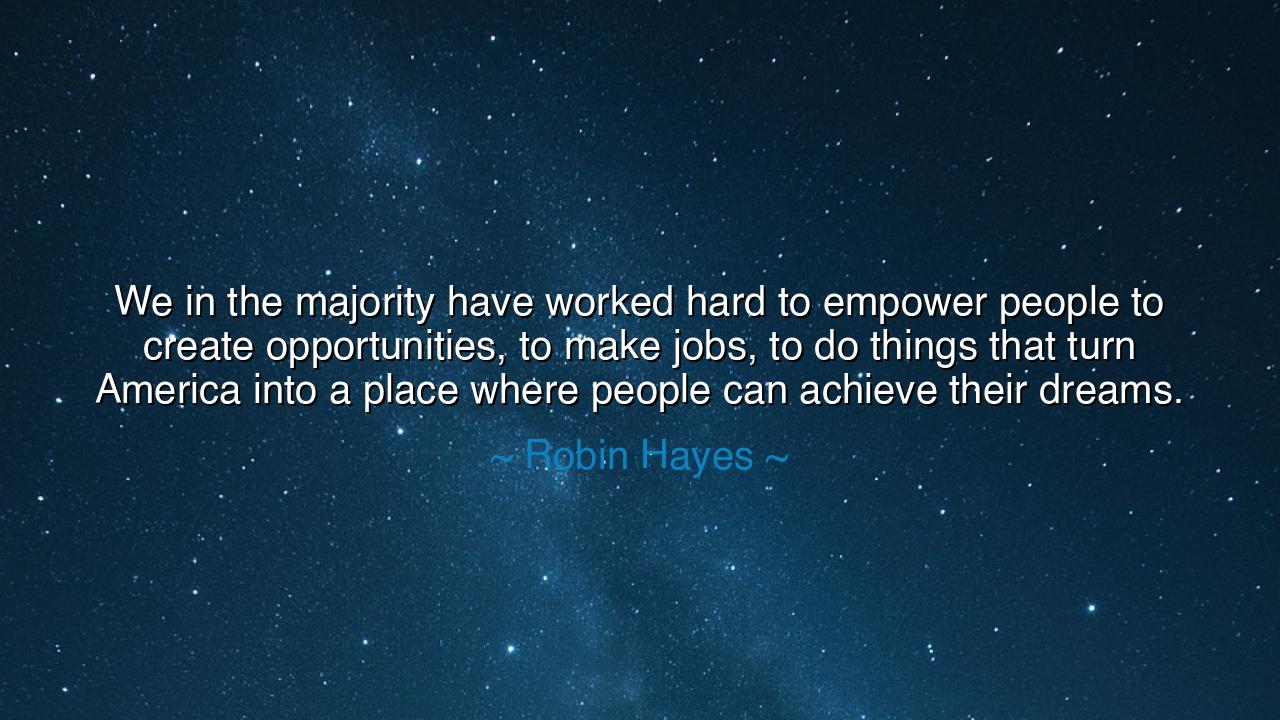
We in the majority have worked hard to empower people to create
We in the majority have worked hard to empower people to create opportunities, to make jobs, to do things that turn America into a place where people can achieve their dreams.






“We in the majority have worked hard to empower people to create opportunities, to make jobs, to do things that turn America into a place where people can achieve their dreams.” – Robin Hayes
Hear, O student of liberty and labor, the words of Robin Hayes, spoken as both declaration and conviction. In these words lies the eternal promise of a people who believe in empowerment, in the sacred duty of creating opportunity, and in the noble dream of shaping a nation where all may rise by the strength of their will. He speaks not merely of policy, but of purpose; not of politics, but of the spirit that builds civilizations. To empower people, as he says, is to give them the means to shape their own destiny—to kindle within each heart the flame of possibility that no government, no circumstance, can extinguish.
Hayes, a statesman from the American tradition, draws from a wellspring that reaches back to the founding ideals of his nation. His words echo the ancient covenant between freedom and responsibility—that liberty is not a gift given, but a trust earned. The majority, as he names it, is not simply a body of legislators or leaders, but a chorus of citizens bound by shared effort. To “work hard to empower” is the calling of all who understand that true strength lies not in control but in creation, not in ruling others, but in lifting them. His vision is that of a society where prosperity is not hoarded, but multiplied—where jobs, innovation, and enterprise are born from the courage of individuals supported by the faith of their community.
Consider, O listener, the tale of Abraham Lincoln, born in poverty, who rose through sheer will to guide his nation through its darkest hour. He did not inherit greatness; he built it through opportunity seized and hardship overcome. The America that Lincoln envisioned—and the one that Hayes invokes—is a land where birth does not bind, where labor ennobles, and where dreams are the inheritance of all. Every worker at the forge, every farmer in the field, every teacher in the classroom becomes a co-creator in the great endeavor of freedom. To create opportunity, then, is not simply to build an economy, but to sustain the soul of a nation.
And yet, Hayes’s words carry more than triumph—they carry duty. For opportunity does not spring from idleness, nor does freedom endure without stewardship. The majority he speaks of must work ceaselessly, not for privilege but for promise. To make jobs is to affirm human dignity; to empower others is to acknowledge that leadership is service, not supremacy. A nation that forgets this truth begins to rot from within, for when the strong cease to lift the weak, both fall together. The call to empower is, therefore, the call to unity—to recognize that the destiny of one is bound to the destiny of all.
In this, Robin Hayes stands in the lineage of the builders—the visionaries who saw that wealth and industry, without virtue, are hollow achievements. Just as the ancient Romans labored to build roads that connected their empire, so must modern nations build the pathways of education, innovation, and equity that connect their people to purpose. It is not enough to create; one must create with intention, ensuring that opportunity reaches the hands of those long denied it. For only then can the dream of a nation become the dream of humanity itself.
There is wisdom here that transcends nations and eras. Every age faces its own temptation—to grow complacent in success, to forget the labor that forged its prosperity. Hayes’s words remind us that dreams are not self-sustaining; they require guardianship. The soil of opportunity must be tended by each generation, or it will grow barren. Every act of mentorship, every business born, every door opened for another, becomes a seed of the future. Those who work to empower others do not merely serve the present—they shape the unseen centuries to come.
So let this teaching guide you, O hearer of truth: if you would strengthen your world, begin not with command, but with empowerment. Help others to build, to dream, to labor, and to achieve. When you create opportunity for one, you enrich the many. When you lift a neighbor, you elevate a nation. For in the end, the greatness of any land is not measured by its wealth or armies, but by the reach of its dreams—and by the hands that help those dreams to rise.
Thus spoke Robin Hayes, and thus should we remember: the true power of a people lies not in their majority, but in their unity of purpose—to create, to uplift, and to believe that every human soul, given the chance, can turn struggle into triumph, and labor into legacy.






AAdministratorAdministrator
Welcome, honored guests. Please leave a comment, we will respond soon